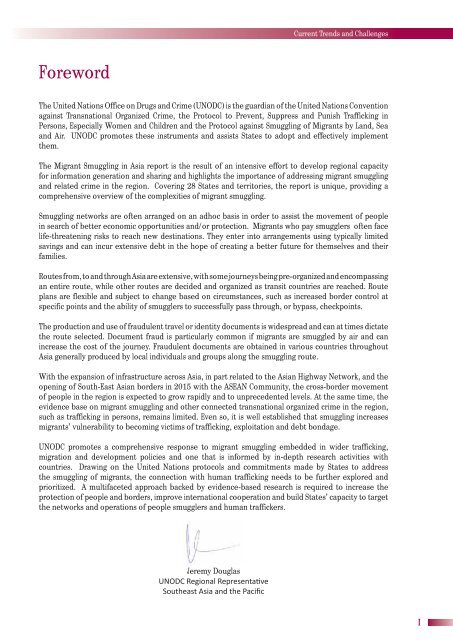Current_Trends_and_Related_Challenges_web
Current_Trends_and_Related_Challenges_web
Current_Trends_and_Related_Challenges_web
Create successful ePaper yourself
Turn your PDF publications into a flip-book with our unique Google optimized e-Paper software.
<strong>Current</strong> <strong>Trends</strong> <strong>and</strong> <strong>Challenges</strong><br />
Foreword<br />
The United Nations Office on Drugs <strong>and</strong> Crime (UNODC) is the guardian of the United Nations Convention<br />
against Transnational Organized Crime, the Protocol to Prevent, Suppress <strong>and</strong> Punish Trafficking in<br />
Persons, Especially Women <strong>and</strong> Children <strong>and</strong> the Protocol against Smuggling of Migrants by L<strong>and</strong>, Sea<br />
<strong>and</strong> Air. UNODC promotes these instruments <strong>and</strong> assists States to adopt <strong>and</strong> effectively implement<br />
them.<br />
The Migrant Smuggling in Asia report is the result of an intensive effort to develop regional capacity<br />
for information generation <strong>and</strong> sharing <strong>and</strong> highlights the importance of addressing migrant smuggling<br />
<strong>and</strong> related crime in the region. Covering 28 States <strong>and</strong> territories, the report is unique, providing a<br />
comprehensive overview of the complexities of migrant smuggling.<br />
Smuggling networks are often arranged on an adhoc basis in order to assist the movement of people<br />
in search of better economic opportunities <strong>and</strong>/or protection. Migrants who pay smugglers often face<br />
life-threatening risks to reach new destinations. They enter into arrangements using typically limited<br />
savings <strong>and</strong> can incur extensive debt in the hope of creating a better future for themselves <strong>and</strong> their<br />
families.<br />
Routes from, to <strong>and</strong> through Asia are extensive, with some journeys being pre-organized <strong>and</strong> encompassing<br />
an entire route, while other routes are decided <strong>and</strong> organized as transit countries are reached. Route<br />
plans are flexible <strong>and</strong> subject to change based on circumstances, such as increased border control at<br />
specific points <strong>and</strong> the ability of smugglers to successfully pass through, or bypass, checkpoints.<br />
The production <strong>and</strong> use of fraudulent travel or identity documents is widespread <strong>and</strong> can at times dictate<br />
the route selected. Document fraud is particularly common if migrants are smuggled by air <strong>and</strong> can<br />
increase the cost of the journey. Fraudulent documents are obtained in various countries throughout<br />
Asia generally produced by local individuals <strong>and</strong> groups along the smuggling route.<br />
With the expansion of infrastructure across Asia, in part related to the Asian Highway Network, <strong>and</strong> the<br />
opening of South-East Asian borders in 2015 with the ASEAN Community, the cross-border movement<br />
of people in the region is expected to grow rapidly <strong>and</strong> to unprecedented levels. At the same time, the<br />
evidence base on migrant smuggling <strong>and</strong> other connected transnational organized crime in the region,<br />
such as trafficking in persons, remains limited. Even so, it is well established that smuggling increases<br />
migrants’ vulnerability to becoming victims of trafficking, exploitation <strong>and</strong> debt bondage.<br />
UNODC promotes a comprehensive response to migrant smuggling embedded in wider trafficking,<br />
migration <strong>and</strong> development policies <strong>and</strong> one that is informed by in-depth research activities with<br />
countries. Drawing on the United Nations protocols <strong>and</strong> commitments made by States to address<br />
the smuggling of migrants, the connection with human trafficking needs to be further explored <strong>and</strong><br />
prioritized. A multifaceted approach backed by evidence-based research is required to increase the<br />
protection of people <strong>and</strong> borders, improve international cooperation <strong>and</strong> build States’ capacity to target<br />
the networks <strong>and</strong> operations of people smugglers <strong>and</strong> human traffickers.<br />
Jeremy Douglas<br />
<br />
<br />
I


